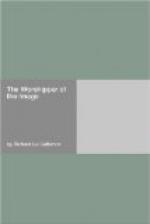ANTONY ALONE ON THE HILLS
But although Beatrice might forgive Antony, from himself came no forgiveness. He hid his remorse from her, sparing the mother-wound in her heart—but always when he was walking alone he kept saying to himself: “I have lost our little Wonder. I killed our little Wonder.”
One day he climbed up the highest hill within reach, and there leaned into the enormous silence, that he might cry it aloud for God to hear—
God!—poor little Beatrice, what God was there to hear! To look at Beatrice one might indeed believe in God—and yet was it not Beatrice who had made God in her own image? Was not God created of all pure overflows of the human soul, the kind light of human eyes that not all the suffering of the world can exhaust, the idealism of the human spirit that not all the infamies of natural law can dismay?
Nevertheless, Antony confessed himself to God upon the hills, not indeed as one seeking pardon, but punishment.
Yet Heaven’s benign untroubled blue carried no cloud upon its face, because one breaking human heart had thus breathed into it its unholy secret. Around that whole enormous circle such cries and such confessions were being poured like noxious vapours, from a thousand cities; but that incorruptible ether remained unsullied as on the first morning, the black smoke of it all lost in the optimism of God.
On some days he would live over again the scene with Wonder in the wood with unbearable vividness.
“Why, those are only words, silly Daddy!”—How many times a day did he not hear that quaint little voice making, with a child’s profundity, that tremendous criticism upon literature.
He had silenced her with the music of words, as he had silenced his own heart and soul with the same music, but they were still only words none the less. Ah! if she were only here to-day, he would bring her something more beautiful than words—or toadstools.
He shuddered as he thought of the loathsome form his decaying fancy had taken, that morning by the Three Black Ponds. He had filled the small outstretched hands with Nature’s filth and poison. She had asked for flowers, he had brought her toadstools. Oh, the shame, the crime, the anguish!
But worst of all was to hear himself saying in the silence of his soul, over and over again without any power to still it, as one is forced sometimes to hear the beating of one’s heart: “Silencieux, I bring you my little child.”
There were times he heard this so plainly when he was with Beatrice that he had to leave her and walk for hours alone. Only unseen among the hills dare he give vent to the mad despair with which that memory tore him.
Yes, for words—“only words”—he had sacrificed that wonderful living thing, a child. For words he had missed that magical intercourse, the intercourse with the mind of a child. How often had she come to him for a story, and he had been dull and preoccupied—with words; how often asked him to take her a walk up the lane, but he had been too busy—with words!




